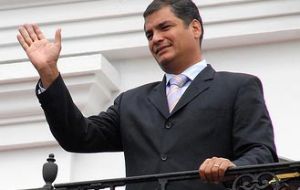MercoPress. South Atlantic News Agency
Ecuadorian president closer to tighter grip of government, including the Judiciary
 Rafael Correa, US trained economist and left leaning populist
Rafael Correa, US trained economist and left leaning populist Ecuador's constitutional Court approved this week a 10-question referendum that will let voters decide whether to ban gambling and bullfighting but also ask them to boost President Rafael Correa's power over the judiciary.
Correa calls the ruling a triumph for democracy but the opposition claims the president is seeking to consolidate his own power and legitimacy after a deadly police rebellion in September. According to January public opinion polls the referendum has a 57% support.
One ballot question asks voters if Ecuador's judiciary should be overseen by a new commission composed of representatives of the executive branch, the national assembly and a transparency body. All three are controlled by Correa's party.
Half the ballot questions amount to constitutional amendments.
”The proposals to amend the constitution got the green light (from the court) and it's now up to the president to make a final decision,“ Chief Justice Patricio Pazmino told reporters.
Correa, a US trained economist and a successful populist politician submitted questions for a popular referendum to the Constitutional Court to verify its legality before it could be approved by the Electoral Council.
Correa is currently serving a four-year term and may run again in 2013.
Amid rising crime, Correa has proposed to amend a preventative detention law that requires detainees to be released after one year without trial.
The measure, said Correa, ”has become a focus of corruption, greater insecurity, by allowing the release of many criminals” and he wants it revoked for those suspected of serious crimes.
Potentially one of the most controversial measures, Correa is also proposing imposing limits on financial companies, the media and other communications firms, to restrict their investments in other sectors.




Top Comments
Disclaimer & comment rulesCommenting for this story is now closed.
If you have a Facebook account, become a fan and comment on our Facebook Page!